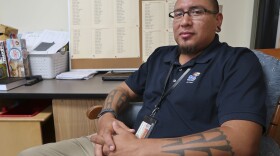In 2019, the Tri-Council of Cherokee tribes declared a State of Emergency for the language. There are fewer than 1,500 remaining fluent speakers.
The struggle is examined in a new documentary film, ᏓᏗᏬᏂᏏ (We Will Speak), which explores how the Cherokee language is deeply tied to Cherokee identity.
Producer Keli Gonzales said she hopes the film will inspire others to learn Cherokee language. Even in her own family, she has experienced the decline of Cherokee language speakers.
“Both my paternal and maternal grandparents spoke Cherokee, and now we just have my maternal grandfather who's alive,” she said. “We only have one speaker now in my family.”
For Gonzalez, the film’s tie to North Carolina is especially important.
“I think it's important for us because our people started in North Carolina,” she said. “Some of us left because of encroachment, and then some of us were forcibly removed to another place. It's awesome to come here and be welcomed because it is technically our home, and they tell you that as a Cherokee person. You come and you meet other Cherokee people and they're like, ‘ Welcome home.’”
The film featured the Eastern Band of Cherokee in Western North Carolina as well as two other bands: the United Keetoowah Band of Cherokee Indians in Oklahoma and the Cherokee Nation in Oklahoma.
In one scene in the film, two fluent speakers talked about how they are fighting to preserve the language.
“I think that statement of hope from two fluent speakers was profound really, and it comes late in the film, after we've detailed the struggle and genocidal and oppressive tactics by the government against the Cherokee and other native peoples,” Co-director Michael McDermit said. “We see what they're up against, and then to still have fluent speakers being able to talk about the future is just a very important thing.”
McDermit said the state of the language has improved in the last few years. At the outset of the filmmaking, McDermit said he anticipated “a monumental task for the tide to change,” but money, effort and care has helped “to bring the language back in some pretty tangible ways.”
The Eastern Band of Cherokee started a master apprentice program to immerse learners in the language, McDermit said.,
The film, which was shot in Oklahoma and in North Carolina from 2019 to 2022, will screen in Swannanoa at Warren Wilson College tonight.







